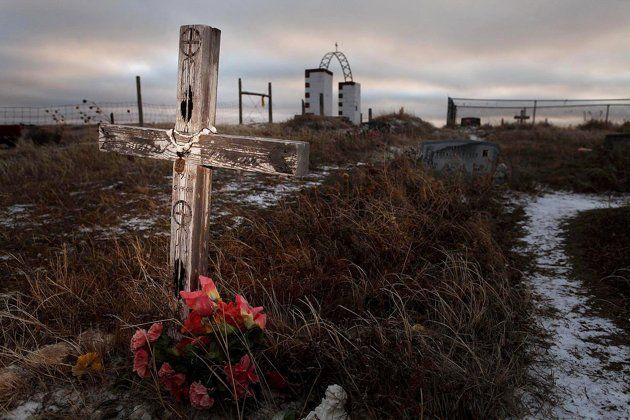
Wounded Knee, the site of one of the most infamous massacres of Native Americans in U.S. history, has recently come up for sale by the owner. Jim Czywczynski of Rapid City, South Dakota has put up the two 40-acre tracts he owns of the site for $3.9 million. Czywczynski has made overtures to the Oglala Sioux Tribe for the past 30 years about purchasing the site, but received no response until he declared the land would be put on the open market May 1st, 2013.
The site itself is the location of an 1890 massacre of Native men, women and children, with estimations of the death toll being anywhere from 150-300 individuals. One of the tracts that is up for sale also contains the last know burial place of Chief Crazy Horse.
These tracts were purchased by Czywczynski's family in 1968, which at the time included his family's home, a trading post, a museum and four cabins. In 1973 these structures were burned down by Native American activists; as a result, Czywczynski's family was left homeless. Czywczynski feels that he is at no fault by asking for this high amount, having never received any compensation for this incident.
"Am I taking advantage of the dead? No. In '73 I was burned to the ground and left homeless." Remarked Czywczynski. "No compensation whatsoever-from the government or anybody else."
Yet, many tribal groups feel that he is attempting to profit off of the historical significance of the site.
"We really feel that he is trying to capitalize on the deaths of our people and make money," Oglala Sioux Tribal President Bryan Brewer said.
These feelings have been further reinforced by the fact that each parcel has been appraised at $7,000 each.
Since making the announcement of impending sale, Czywczynski has received offers from private buyers who have an interest in buying the property and donating them to the tribes or the federal government.
While this developments seem favorable, many tribal groups still worry that the final transaction could see these parcels falling into the hands of a developer. They hope that this sale would be overtaken by the federal government and declared a National Historic Landmark. Even though these tracts include a burial site, because they are privately owned they do not fall under the jurisdictions of the Native American Graves Protection and Repatriation Act (NAGPRA).
What are your thoughts on this issue? Should Mr. Czywczynski be able to price and sell these lands whatever way he sees fit, or should more steps be made to ensure that these lands end up in the possession of the tribes? Please leave a comment below and let us know your thoughts!
© 2025 Latin Times. All rights reserved. Do not reproduce without permission.




